119 books about Thomas, Aquinas, Saint and 6
start with C
119 books about Thomas, Aquinas, Saint and 6
119 books about Thomas, Aquinas, Saint
6 start with C start with C
6 start with C start with C
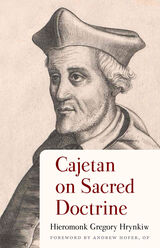
Cajetan on Sacred Doctrine
Hieromonk Gregory Hrynkiw
Catholic University of America Press, 2020
Cardinal Tommaso de Vio (1469-1534), commonly known as Cajetan, remains a misunderstood figure. Cajetan on Sacred Doctrine is the first ever monograph on Cajetan as a theologian in his own right, and it fills an immense lacuna in the debate on the nature of sacred doctrine from the Thomism of the Renaissance. Confirming Cajetan as a key protagonist within the emergent Reformation, this work delivers an indispensable immersion into his theological method in relation to his closest predecessors and contemporaries: Hervaeus Natalis, Blessed Duns Scotus, Gregory of Rimini, Johannes Capreolus, Silvestro Mazzolini da Prierio, Martin Luther, and others.
The first ever commentary on St. Thomas Aquinas’s entire Summa Theologiae was published by Cajetan. This monograph focuses primarily on the Summa Theologiae Ia pars, question 1, concerning sacred doctrine, and how Cajetan unpacks the potency of Aquinas’s opening syllogism, setting forth a coherent division of the question, and ultimately touching the mind of Aquinas when revealing the articles of the Apostles’ Creed as the Summa Theologiae’s macrostructure. Finally, we are shown how Cajetan emphasizes the essential link between ecclesiology and the communication of sacred doctrine, especially the papacy’s role in guaranteeing the proposal and explication of the faith.
Cajetan’s accomplishments as a biblical exegete established him as a renowned Renaissance scholar and a forerunner of future ecumenical dialogue. Furthermore, his grasp of theology’s perennial properties continue to make him an important interlocutor in the renewed quest for a unity in theology in an ever more fragmented aggregation of theologies.
Cajetan’s theological labor is a perpetuation of the via antiqua, a biblical-theological worldview handed down through Tradition. St. Gregory the Theologian (329-390), the via antiqua’s preeminent Eastern representative and chief theological constructor of Christendom, offers the monograph’s author--himself a Byzantine Hieromonk--a prime opportunity for a few closing insights on the innate symphony between two very distant periods and distinct theological traditions within the one ecumenical Church.
[more]
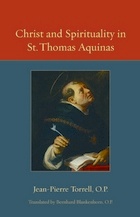
Christ and Spirituality in St. Thomas Aquinas
Jean-Pierre Torrell
Catholic University of America Press, 2011
The studies in this volume investigate themes of particular spiritual relevance in Aquinas's theology: friendship, charity, prayer, configuration to Christ, priesthood, preaching.
[more]
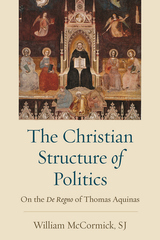
The Christian Structure of Politics
The De Regno of Thomas Aquinas
William McCormick, SJ
Catholic University of America Press, 2022
The Christian Structure of Politics, the first full-length monograph on Thomas Aquinas's De Regno in decades, offers an authoritative interpretation of De Regno as a contribution to our understanding of Aquinas's politics, particularly on the relationship between Church and State. William McCormick argues that Aquinas takes up a via media between Augustine and Aristotle in De Regno, invoking human nature to ground politics as rational, but also Christian principles to limit politics because of both sin and the supernatural end of man beyond politics. Where others have seen disjoined sections on the best regime, tyranny, and the reward of the king, McCormick identifies a dialogical structure to the text - one not unlike the disputed question format - whereby Aquinas both tempers expectations for the best government and offers a spiritual diagnosis of tyranny, culminating in a sharp critique of civil religion and political theology.
McCormick draws upon historical research on Aquinas' context, especially that of Anthony Black, Cary Nederman and Francis Oakley, from which he develops three themes: the medieval preponderance of kingship and royal ideology; the relationship between Church and State; and the intersection of Latin Christianity and Greco-Roman antiquity. While age-old concerns, recent research in these areas has allowed us to move beyond simplistic platitudes.
For scholars of political theory and the history of political thought, De Regno will prove fascinating for the interplay of Aristotelian and Augustinian elements, undercutting the conventional wisdom that Aquinas was simply an Aristotelian. De Regno also includes an extended treatment of civil religion, one of Aquinas’ most historically-oriented discussions of politics.
[more]
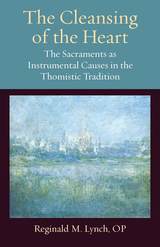
The Cleansing of the Heart
Reginald Lynch
Catholic University of America Press, 2017
Recalling the Biblical and Patristic roots of the Church's sacramental identity, the Second Vatican Council calls the Church the 'visible sacrament' of that unity offered through Christ (LG 9). 'Sacrament' in this sense not only describes who the Church is, but what she does. In this regard, the Council Fathers were careful to establish a strong connection between the symbolic nature of the Church's sacraments and their effect on those who received them.
Reginald Lynch is concerned with the cleansing of the heart—a phrase borrowed from St. Augustine and employed by Aquinas, which describes the effects that natural elements such as water or bread have on the human person when taken up by the Church as sacramental signs. Aquinas' approach to sacramental efficacy is unique for its integration of diverse theological topics such as Christology, merit, grace, creation and instrumentality. While all of these topics will be considered to some extent, the primary focus of The Cleansing of the Heart is the sacraments understood as instrumental causes of grace. This volume provides the historical context for understanding the development of sacramental causality as a theological topic in the scholastic period, emphasizing the unique features of Aquinas' response to this question. Following this, relevant texts from Aquinas' early and later work are examined, noting Aquinas' development and integration of the idea of sacramental causality in his later work. The Cleansing of the Heart concludes by contrasting alternatives to Aquinas' theory of sacramental causality that subsequently emerged. The rise of humanism introduced many changes within rhetoric and philosophy of language that had a profound effect on some theologians during the Modern period. This book provides historical context for understanding the most prominent of these theories in contrast to Aquinas, and examines some of their theological implications.
Reginald Lynch is concerned with the cleansing of the heart—a phrase borrowed from St. Augustine and employed by Aquinas, which describes the effects that natural elements such as water or bread have on the human person when taken up by the Church as sacramental signs. Aquinas' approach to sacramental efficacy is unique for its integration of diverse theological topics such as Christology, merit, grace, creation and instrumentality. While all of these topics will be considered to some extent, the primary focus of The Cleansing of the Heart is the sacraments understood as instrumental causes of grace. This volume provides the historical context for understanding the development of sacramental causality as a theological topic in the scholastic period, emphasizing the unique features of Aquinas' response to this question. Following this, relevant texts from Aquinas' early and later work are examined, noting Aquinas' development and integration of the idea of sacramental causality in his later work. The Cleansing of the Heart concludes by contrasting alternatives to Aquinas' theory of sacramental causality that subsequently emerged. The rise of humanism introduced many changes within rhetoric and philosophy of language that had a profound effect on some theologians during the Modern period. This book provides historical context for understanding the most prominent of these theories in contrast to Aquinas, and examines some of their theological implications.
[more]
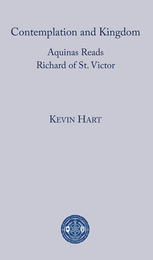
Contemplation and Kingdom
Kevin Hart
St. Augustine's Press, 2020
This book rises out of Dr. Kevin Hart’s 2020 Aquinas Lecture at the University of Dallas. Contemplation and Kingdom seeks to retrieve aspects of Richard of St. Victor's treatment of contemplation, principally in De arca mystica, and does so by weighing Thomas Aquinas's reservations about this treatment in the Summa theologiæ. Is Aquinas right to object, as Augustine does in De Doctrina Christiana, that our contemplation should go directly to God and not be stalled in the consideration of the natural world? What relation is there between Jesus's preaching of the Kingdom and the contemplation of God? Is the contemplative life consistent with Jesus's injunction to love both God and neighbor? These are the principal questions considered in the book.
This book is vintage Hart, erudite, well written, a treat for a wide readership. It is an example of how theology ought to be done, with a clarity and depth unsurpassed in today’s scholarly world. Its blend of anglo-saxon elegance and continental insights will be praised in the Academy and outside. – Jean-Yves Lacoste, Clare Hall, Cambridge
In the light of great contemporary interest in contemplation, this brilliant and erudite work is a stunning example. The focus on Richard of St. Victor and Thomas Aquinas is especially appropriate. Theologians and philosophers will be especially thankful for Kevin Hart’s work on the actuality of contemplation. – David Tracy, University of Chicago
Kevin Hart holds the Edwin B. Kyle Chair of Christian Theology at the University of Virginia where he is also Courtesy Professor of English and Courtesy Professor of French. In 2020 he was awarded the Aquinas Medal by the Department of Philosophy at the University of Dallas. His 2020 Étienne Gilson Lectures, given at L'Institut Catholique de Paris, offer a fresh approach to the theology of the imago dei in Augustine. His 2020 Gifford Lectures, given at Glasgow University, examine various questions to do with the theology of contemplation and propose a new "hermeneutics of contemplation." His most recent scholarly publications include Kingdoms of God and Poetry and Revelation, and his most recent collections of poetry are Wild Track: New and Selected Poems and Barefoot.
This book is vintage Hart, erudite, well written, a treat for a wide readership. It is an example of how theology ought to be done, with a clarity and depth unsurpassed in today’s scholarly world. Its blend of anglo-saxon elegance and continental insights will be praised in the Academy and outside. – Jean-Yves Lacoste, Clare Hall, Cambridge
In the light of great contemporary interest in contemplation, this brilliant and erudite work is a stunning example. The focus on Richard of St. Victor and Thomas Aquinas is especially appropriate. Theologians and philosophers will be especially thankful for Kevin Hart’s work on the actuality of contemplation. – David Tracy, University of Chicago
Kevin Hart holds the Edwin B. Kyle Chair of Christian Theology at the University of Virginia where he is also Courtesy Professor of English and Courtesy Professor of French. In 2020 he was awarded the Aquinas Medal by the Department of Philosophy at the University of Dallas. His 2020 Étienne Gilson Lectures, given at L'Institut Catholique de Paris, offer a fresh approach to the theology of the imago dei in Augustine. His 2020 Gifford Lectures, given at Glasgow University, examine various questions to do with the theology of contemplation and propose a new "hermeneutics of contemplation." His most recent scholarly publications include Kingdoms of God and Poetry and Revelation, and his most recent collections of poetry are Wild Track: New and Selected Poems and Barefoot.
[more]
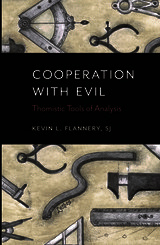
Cooperation with Evil
Thomistic Tools of Analysis
Kevin L. Flannery, SJ
Catholic University of America Press, 2019
Contemporary society very often asks of individuals and/or corporate entities that they perform actions connected in some way with the immoral actions of other individuals or entities. Typically, in the attempt to determine what would be unacceptable cooperation with such immoral actions, Christian scholars and authorities refer to the distinction, which appears in the writings of Alphonsus Liguori, between material and formal cooperation, the latter being connected in some way with the cooperator's intention in so acting. While expressing agreement with most of Alphonsus's determinations in these regards, Cooperation with Evil also argues that the philosophical background to these determinations often lacks coherence, especially when compared to related passages in the writings of Thomas Aquinas.
Having compared the philosophical approaches of these two great moralists, Cooperation with Evil then describes a number of ideas in Thomas's writings that might serve as more effective tools for the analysis of cases of possible immoral cooperation. The book also includes, as appendixes, translations of relevant passages in both Alphonsus and Thomas.
[more]
READERS
Browse our collection.
PUBLISHERS
See BiblioVault's publisher services.
STUDENT SERVICES
Files for college accessibility offices.
UChicago Accessibility Resources
home | accessibility | search | about | contact us
BiblioVault ® 2001 - 2024
The University of Chicago Press









